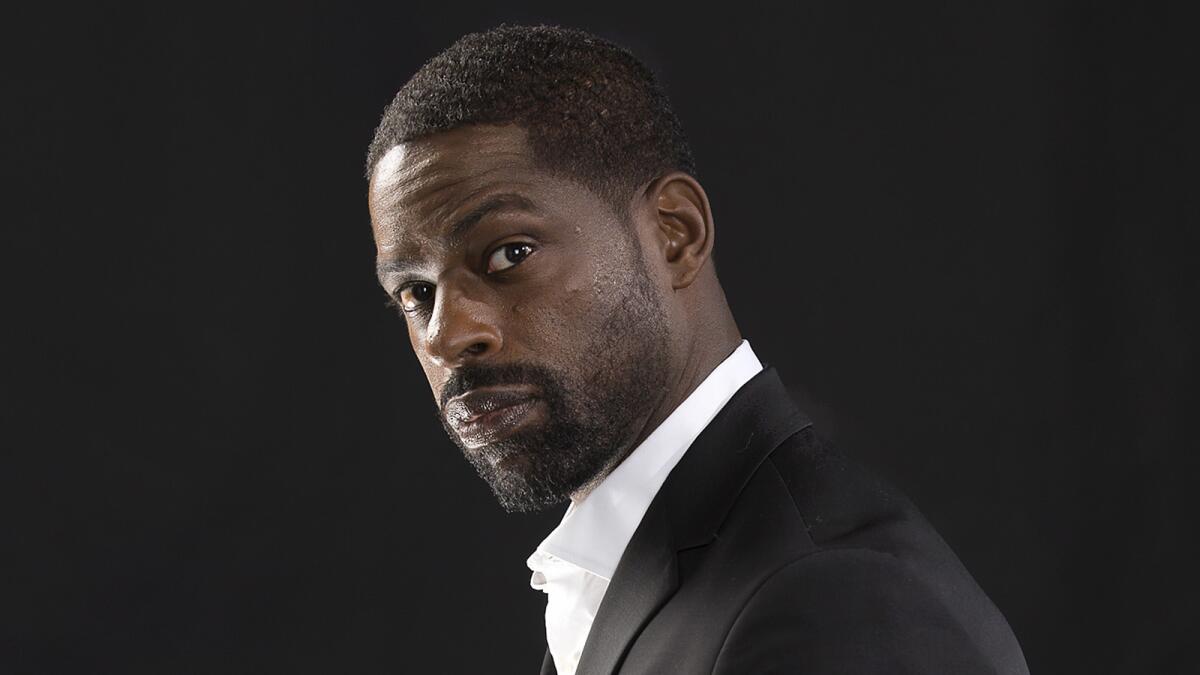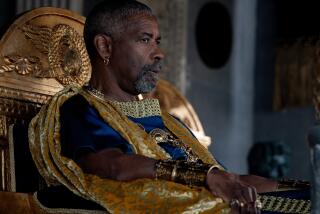Q&A: Sterling K. Brown reflects on playing O.J. prosecutor Chris Darden on TV and a slave in the ‘Father Comes Home’ play

Sterling K. Brown has the lead role as Hero in Suzan-Lori Parks’ play “Father Comes Home.”
- Share via
Fresh off his career-defining role as prosecutor Christopher Darden in FX’s acclaimed limited series “The People v. O.J. Simpson: American Crime Story,” Sterling K. Brown is revisiting an old friend.
Half a mile from Los Angeles Superior Court, where O.J. Simpson was tried on two counts of murder for the 1994 deaths of his ex-wife, Nicole Brown Simpson, and waiter Ronald Lyle Goldman, Brown can be seen on stage at the Mark Taper Forum in the Suzan-Lori Parks play “Father Comes Home From the Wars (Parts 1, 2 & 3).”
The dramedy explores the work and personal lives of Civil War-era slaves. Brown stars as Hero, a slave who must choose whether to join his master fighting for the Confederacy in exchange for his freedom. He will appear in the production through Sunday. (The production continues without him until May 15.)
Brown originated the role at New York’s Public Theater in 2014. We spoke to the actor about returning to the character and seeing the parallels between Hero and Darden. .
Did the decision to come back happen pre-O.J. or post-O.J.?
Post, I believe, because we finished shooting in October of 2015, and it was after we were done shooting the show that they knew it was going to be scheduled at the Taper.
When you started rehearsals, was everyone talking about “People v. O.J. Simpson”?
A few people. Some of the cast was watching, some of the cast was not. They may or may not have FX in their apartment complex, so a lot of them were watching on their computers. But everybody was very complimentary and very sweet. I tried not to bring it up too much because I was focused on the task at hand. They said positive things, by and large — you never get tired of hearing positivity.
With so much happening for you right now, why did you decide to continue with “Father Comes Home from the Wars”?
When the play first came to me, I’d been a fan of the casting directors at the Public Theater in New York for a long time. Heidi Griffiths and Jordan Thaler. They were always interested in me coming back to do a particular project. Suzan-Lori wrote this play so many years ago, and as it was moving toward production, they were like, “We think Sterling Brown should be a part of this.” And so I was honored that they considered me in the first place.
And Suzan-Lori Parks wrote a play that was one of the theatrical highlights of my life — going to see “Topdog/Underdog,” with Don Cheadle and Jeffrey Wright. It blew me away. And it won the Pulitzer Prize, deservedly so. The fact that this woman asked me to be a part of something that she was creating, it wasn’t a very hard sell. So the opportunity to come back to it, in my hometown, where I don’t have to uproot myself from my family for several months and I get to still be a father and a husband — although, if you ask my wife, she may tell you differently because it does take up a lot of time. But the opportunity to do theater, which is how I first came into this business in the first place, and be home at the same time, was too good to pass up.
What initially spoke to you about this play?
The play is set in the Civil War on a plantation in West Texas. And even though it’s set in that time, it’s not supposed to be a period piece. As you can see, some of the costume design elements throw things very jarringly into the present day. Even the vernacular gives you some phrases like “true dat.”
I think Suzan-Lori set out to create a piece of theater that didn’t leave people thinking, “Wow, what a shame slavery was, glad we got over that.” It’s still an institution that affects the way in which we live our lives, even today. I think in regards to Hero and Homer, in particular, they are these two slaves that are both left with scars — one in a physical manifestation, and the other in a psychological manifestation. No one escaped from it unscathed.
But at the end of the day, when Hero says, “These are my hands now,” what he’s trying to say is: Slavery is real, slavery has done a number on me, but at the end of the day, I have to take responsibility for my own actions. And own myself. The act of owning oneself, recognizing that he is his own man, he decides to bury the boss master, and now he can start his life anew. And that’s such an interesting place to be in, for me.
And it’s interesting. As a kid growing up St. Louis, Missouri, I lived in a predominantly black neighborhood. Any time people talked about slavery, it was always something like, “If I was a slave, I wouldn’t have been putting up with that. I would have been out in a heartbeat.” And it’s like, sure, it’s a very easy thing to say. But when actually faced with the realities of that institution, we can only speculate. Suzan-Lori gives us a vast diorama of the different perspectives of how to navigate that institution: to flee, to stay, or this very indecent proposal that the master brings to Hero’s table, which is to go and fight with the Confederacy with the hopes of gaining your freedom when the war is over.
There’s a moment in the play where it’s said: “The worth of a colored man once he’s made free is less than his worth when his slave.”
In that whole section of Part 2, you can tell that Hero is really struggling with the concept of freedom. When the paradigm that he has known for the entirety of his lifetime is slavery, how does one imagine something outside of the paradigm? You have to be worth something, right? It’s not quite landing the idea that, no, you own yourself. That, in it of itself, is a very scary proposition because there’s something about being someone’s property, being something of worth or value, that keeps you safe from the rest of society. When you know you no longer belong to someone in that way, what’s to keep anyone from doing to you what they wish to do?
And so the resonance that has for me, in particular, being from St. Louis and doing this play in N.Y.C. — the incident with Mike Brown had transpired in Ferguson. The failure to indict happened while we were performing the show. And it was just heart-wrenching on a personal level for me. I go back to this statement from the Watchman: “Who watches the Watchman?” The people who are supposed to protect and serve us. And particularly coming off the O.J. Simpson project.
There is a reason that many African Americans have a healthy mistrust for law enforcement. We don’t always feel protected or served by that particular institution.
So there’s something frightening that comes with freedom. And there was something very frightening for a lot of slaves once they were free and were going through Reconstruction. It was like, what do you do now? There was nothing set up. Most people wound up sharecropping and staying on the land where they had once been slaves. So, yeah, that night when the lack of indictment transpired in the Mike Brown case, people were just crying. But we had this play that gave us sort of a mouthpiece to express what we couldn’t necessarily express on our own. At the end of the show we decided as a cast that we would put our hands up in “hands up, don’t shoot” posture and it was such a powerful moment that Suzan-Lori decided that she wanted to incorporate it into the play itself. So when Hero says, “I belong to the boss master,” he puts his hands up, as if to say, “Don’t shoot me. I’m just going about my business.”
There is this parallel between Hero and Darden in that they’re both sort of viewed as traitors by their communities.
That’s interesting. They are definitely two individuals that don’t have the most popular standing with regards with how they should navigate their personal lives.
Hero puts a lot of stock in the master’s word because he tries to be a man of word himself, even though he falls short. ... He himself is the closest to the master, and Suzan-Lori is very much saying, you can’t help, to a certain degree, to become akin to the people whom you spend the most time with. And at the end of the play, it’s almost like you’ve seen three different Heros. You see Hero, the alpha male, at the beginning of the play; a very subservient Hero in Part 2; and by the end you see a man who has literally changed by virtue of war, by virtue of exposure to the master.
And then Darden, being in a very particular crossroads — being a prominent black member of the prosecution at a time when black America was very much on the side of the defense in the O.J. Simpson trial — that was interesting because I heard that a few named actors had passed on the role because of how unpopular he was.
And so it’s interesting for me to try to get into the skin of both of these individuals because you can’t judge someone and play them at the same time. You have to have some real compassion and empathy for them. And you don’t necessarily have to like them or love them, but you have to understand their perspective. And you have to be able to communicate their perspective without bias, as strongly as you can. I think that’s what attracted me to these characters who can seem very problematic.
For me, it’s a release in judgment. I may have had feelings about Hero before this process began, I may have had my feelings about Darden before it all began, but when you strip yourself of that judgment and try to authentically walk in their shoes as best as you can, you can’t help but come away with a sense of love for them because you have to tell their story.
More to Read
The biggest entertainment stories
Get our big stories about Hollywood, film, television, music, arts, culture and more right in your inbox as soon as they publish.
You may occasionally receive promotional content from the Los Angeles Times.











